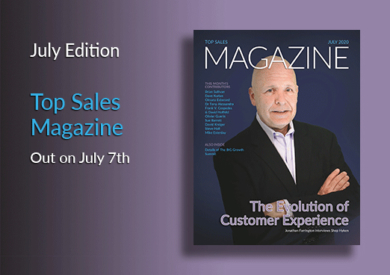Successful Selling When Your World Turns Upside Down
By Mike Esterday for the July 2020 issue of Top Sales Magazine.
“You can’t use an old map to explore a new world.” -Albert Einstein
Memo to sales managers everywhere: Your job has changed. Your salespeople are not the same as they were mere months ago. And you now have different customers, too. Welcome to your new career – let’s explore how it’s different from your old one.
As the COVID19 pandemic lingers and with fears of it cycling back in a threatened phase two, we’re all reminded daily that we’re living in a time of extraordinary challenge. It’s everywhere and in most interactions – perhaps increasingly via Zoom, but also in the in-person conversations we’re having with colleagues and customers.
The world is struggling to get back on its feet – but we know this much: It’s a much different world now. What does that mean for leading teams and engaging customers?
First, a quick note from down on the farm. As a kid growing up in rural Illinois, I saw firsthand how running a farm meant dealing with the day to day urgencies and planning for the next season. But if the cows got out of the pasture, any planning for next Spring was quickly pushed aside. Our focus was all about getting the cows back behind the fence.
As Mike Tyson said, “Everyone has a plan ‘til they get punched in the face.”
So too for now, and for the last few months. During a crisis, it’s necessary to focus on stabilizing the situation and assessing where you’re at. But once that’s done – you need to balance the immediacy with assessing where to go from here. Bottom line: In most sectors of the economy, it’s relatively easy to sell in a strong economy – in fact in some white-hot businesses, selling in boom times can look like order taking. But tough times – and we’re in them for sure – require a whole other level of skill and will.
The Manager and The Coach
Successful sales managers typically focus on what it takes to run a good sales operation. Much of the job is aimed at helping salespeople increase their productivity – including managing their activities, conducting opportunity and pipeline reviews, planning and budgeting, and managing/optimizing their territory. That’s the business side of the sales manager’s role.
But there’s another piece that has become critically important in the age of COVID19: the sales manager as coach. The shift to coaching is about meeting your people where they are right now – especially now, as they continue to find their footing in the much-discussed new normal.
Coaching Tips for Managers
During tough times, it’s natural to focus even more on activities and numbers. These are important, but the focus with coaching is on building and developing people – and it aims at mindset in addition to skillset. Some examples include:
- Creating a safe environment so people will tell you the truth
- Asking questions and really listening to words, body language and tone of voice
- Enhancing self-awareness of your strengths and areas for improvement
- Clarifying your salespeople’s professional and personal goals
- Addressing difficult conversations and challenging them to be their best
- Expressing belief and building confidence
Timely Tips for Salespeople
Dramatic change requires moving fast. That’s not just making more calls, showing more solutions or working harder, although these are important. It means shifting your mindset and working smarter … starting today!
A former manager once gave me some great advice …“First, accept your situation exactly as it is.”There isn’t time to wallow in self-pity and crying about how this isn’t fair. Perhaps it’s not, but understand the reality of where you are and decide what you’re going to do about it.
During challenging times, many salespeople spend more time worrying than acting. Take some time to assess your skills and attitude by asking yourself these questions:
- Are my motives pure in wanting to serve customers or am I just trying to sell something? Believe it or not, they can tell.
- Have I taken some customers for granted? If so, how can I change this?
- What am I reading and watching that will inspire me to see greater potential?
- How well do I strategically plan for each account and pre-call plan each conversation?
- Do I take the time to study and be an expert on all of my solutions and my competitors?
- Am I willing to go the extra mile to maximize the value my solutions create for customers?
Your candid answers to these questions will help you know clearly what to do differently now.
Final Thought
It’s true for both sales and sales leadership: Your greatest opportunities for success come in times when you are tested the most. That might sound a bit counter intuitive, but it’s true.
And in times of great challenge, we are reminded that: Professionals are good, they know why they are good, and they are always trying to get better.
Don’t wait to take action to improve both your skillset and also your mindset. Both are critically important and make sure you’re guarding against focusing on just one (typically: skillset) over the other. You’ll come out the other side more successful in sales and more centered as a person


